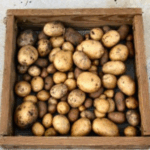There are many types of lettuce, all of them very easy to grow.
Lettuce Varieties and Types
While there are many types of lettuce, the big three that are grown throughout the United States are leaf, head and cos.
- Leaf lettuces have a loose, open appearance; think “green” or “red” leaf lettuces.
- Head lettuces are the typical iceberg lettuce heads wrapped in plastic you find at the market or plopped onto your mass-produced chain store hamburger. Tasteless, almost white, commercially grown iceberg is actually difficult to grow in the home garden (more on that later) so if it’s the only type of lettuce your family enjoys, it’s better to buy it than to grow it.
- Cos lettuce is also called Romaine lettuce. It has thick green leaves and a mild flavor. It is also a little difficult to grow in the garden, but not impossible!
These are the big three you can find in almost any store, so if you’re new to growing lettuce you might want to try to grow something you can taste beforehand. That’s especially important if you have a family, since kids can be fussy about trying new foods.
Gourmet Lettuce Varieties
If you’re feeling adventurous, there are plenty of other types of lettuce to try – and some of them are delicious! Mixed into salad bowl, they also create a beautiful meal filled with intriguing textures, colors and flavors.
- Butterhead lettuces have smaller, more delicate leaves. This is the type my dad grew in the backyard garden and probably the easiest for anyone to grow. Bibb, Buttercrunch and Boston lettuces are types of lettuce most familiar to home gardeners.
- Summercrisp lettuce varieties are good for our hot, southern climate since they are ‘bolt resistant’, meaning they don’t go to seed in hot weather quite as fast as other types. Batavia and French Crisp are varieties to try.
Some lettuces are grown primarily for their stalks. Many Chinese dishes use these types of lettuce since the stalks stay crisp and firm during cooking. Lastly, lettuce can be grown for its oily seeds. This lettuce is often grown commercially, and the oil extracted from the seeds is used in cooking oil blends.
Types of Lettuce for Virginia Gardens
I found a great publication online called Organic Lettuce Production in Virginia that covers not only the types of lettuce that thrive in our state, but all sorts of cultivation practices to grow organic lettuce. This booklet is available at no charge online and on page 12 you can find a long list of varieties suitable for Virginia’s variable climate.
A few favorites that I’ve grown successfully here at Seven Oaks include:
Romaine – I’ve grown Romaine lettuce, but it never grows very tall. It takes fine, though, so I grow it to mix into my salad bowl.
- Red Sails – a red leaf variety, Red Sails has a beautiful ruby color and flavorful leaves.
- Ice Queen – a nice cool weather variety with icy green foliage and a crisp, sweet flavor.
- Buttercrunch – fast growing, small leaf variety, Buttercrunch gives you plenty of lettuce with very little effort.
I also like to grow the gourmet lettuce mixtures that includes oak leaf varieties and mesclun salad mixtures. These gourmet greens set you back several dollars at the grocery store, but a $1.29 package of seeds from Tractor Supply or Lowe’s yields dozens of salads. They’re fun to grow and even more enjoyable to eat! Burpee Seed offers a nice gourmet salad seed blend that’s worth a try.
Succession Planting
Whatever you choose to grow in your garden, make sure you do not plant all the seeds at once. Plant seeds every two weeks to ensure a constant supply rather than one big harvest.
This planting method is called succession planting, and it ensures that there is a continuous supply of fresh lettuce rather than one big harvest. You can’t store lettuce easily, so by planting a a row every two weeks, you will have a constant supply.
Growing Lettuce
Lettuce has come a long way in my life from a bowl of iceberg plopped onto the dinner table next to a bottle of Italian dressing to a luscious gourmet green I crave each spring.
Growing up on Long Island, I was never a fan of garden lettuce. Each spring and summer, my dad would grow Bibb and Buttercrunch lettuce in the garden. To me, they tasted funny – butter. Worse, slugs and earwigs nestled between the leaves. I can’t tell you how many good dinner salads were ruined by a surprised earwig darted out from under a shower of Wishbone Italian Dressing.
As an adult, I’ve grown to appreciate the culinary richness of the many types of lettuce available to backyard gardeners. Iceberg, Romaine and some of the loose leaf lettuce varieties may be the most commercially viable, and thus the most readily available at the supermarket, but there’s a wealth of tastes, textures and colors available to the backyard gardener just waiting to be explores.
Updated March 2023 with added information, major text revision, links and images.





Im a bit bashful to admit that I didn’t realize there were so many types of lettuce! But I DO like lettuce and I bet I would like them all. Wish I could grown one on my small window garden!
I would love to plant romaine lettuce! Would be so nice to go to your garden to get your salad ingredients! Thanks for sharing at #HomeMattersParty